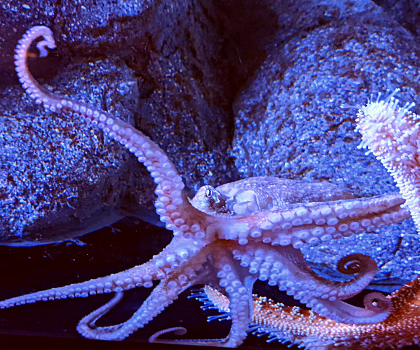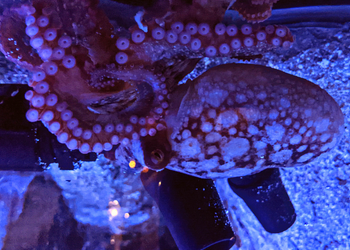 Today we would like to wish our two octopuses here at Akron Zoo a happy World Octopus Day! On this day, octopods all over the globe are being celebrated for being the smart and fascinating animals we know and love. These prehistoric predators have used their quick learning and problem-solving skills to develop a wide range of cool behaviors, such as camouflage, mimicry (pretending to look like a different animal to fend off predators or catch prey) and even communication through changing the color or texture of their skin. It’s no wonder they have adapted to live in all of the world’s oceans.
Today we would like to wish our two octopuses here at Akron Zoo a happy World Octopus Day! On this day, octopods all over the globe are being celebrated for being the smart and fascinating animals we know and love. These prehistoric predators have used their quick learning and problem-solving skills to develop a wide range of cool behaviors, such as camouflage, mimicry (pretending to look like a different animal to fend off predators or catch prey) and even communication through changing the color or texture of their skin. It’s no wonder they have adapted to live in all of the world’s oceans.
Here at the Akron Zoo, we have two female red octopuses that live in Curious Creatures. These ladies came to us all the way from Monterey, California and can usually be seen in the nooks and crannies of their saltwater habitat during the day, particularly in the corners. However, these two aren’t hiding. They are doing something special – tending their eggs! Shortly after arriving at the Akron Zoo both octopods quickly began the process of laying tens of thousands of tiny little eggs, no larger than half a grain of rice. Although the eggs are infertile, they will tend the eggs, like the excellent mothers they are, making sure that they are clean and have the proper amount of water flow to stay healthy.
Because octopuses have no bones, they are able to easily squeeze into tiny spaces. Even the largest known species of octopus, the giant Pacific octopus, can squeeze through an opening the size of a quarter. In fact, red octopuses such as ours have discovered that empty glass bottles thrown in the ocean make pretty good dens to sleep in. While octopuses generally live their lives flying solo, researchers have learned that red octopuses have learned to tolerate each other in much closer quarters than other species of octopus because of how close these glass bottles drift towards each other on the ocean floor. In order to get along in their native habitat, this species has created a language of sorts by changing their color, texture and shape to let each other know who’s the boss or when to back off.
 Now, I know what you are thinking… I thought the plural of octopus is octopi?! And while it’s pretty commonly accepted to use the term octopi, even in the popular game of Scrabble, technically speaking the correct term is octopuses because the root of the word is Greek and not Latin.
Now, I know what you are thinking… I thought the plural of octopus is octopi?! And while it’s pretty commonly accepted to use the term octopi, even in the popular game of Scrabble, technically speaking the correct term is octopuses because the root of the word is Greek and not Latin.
So come on down to the Akron Zoo to say hi to our eight-legged friends and see these tentacular geniuses in action (or inaction as they tend their eggs) to let them know how much you appreciate them.
Want to help octopuses even more? Like many of the ocean’s creatures, overharvesting and poor fishing practices are causing their numbers to decline. Believe it or not, becoming a responsible buyer and only eating sustainably caught seafood is one of the greatest ways we can help save our sea life. To learn more, check out Seafood Watch (www.seafoodwatch.org), created by our friends at Monterey Bay Aquarium, for helpful guides on what to look for when buying seafood sustainably. With your help we can all make a difference.
